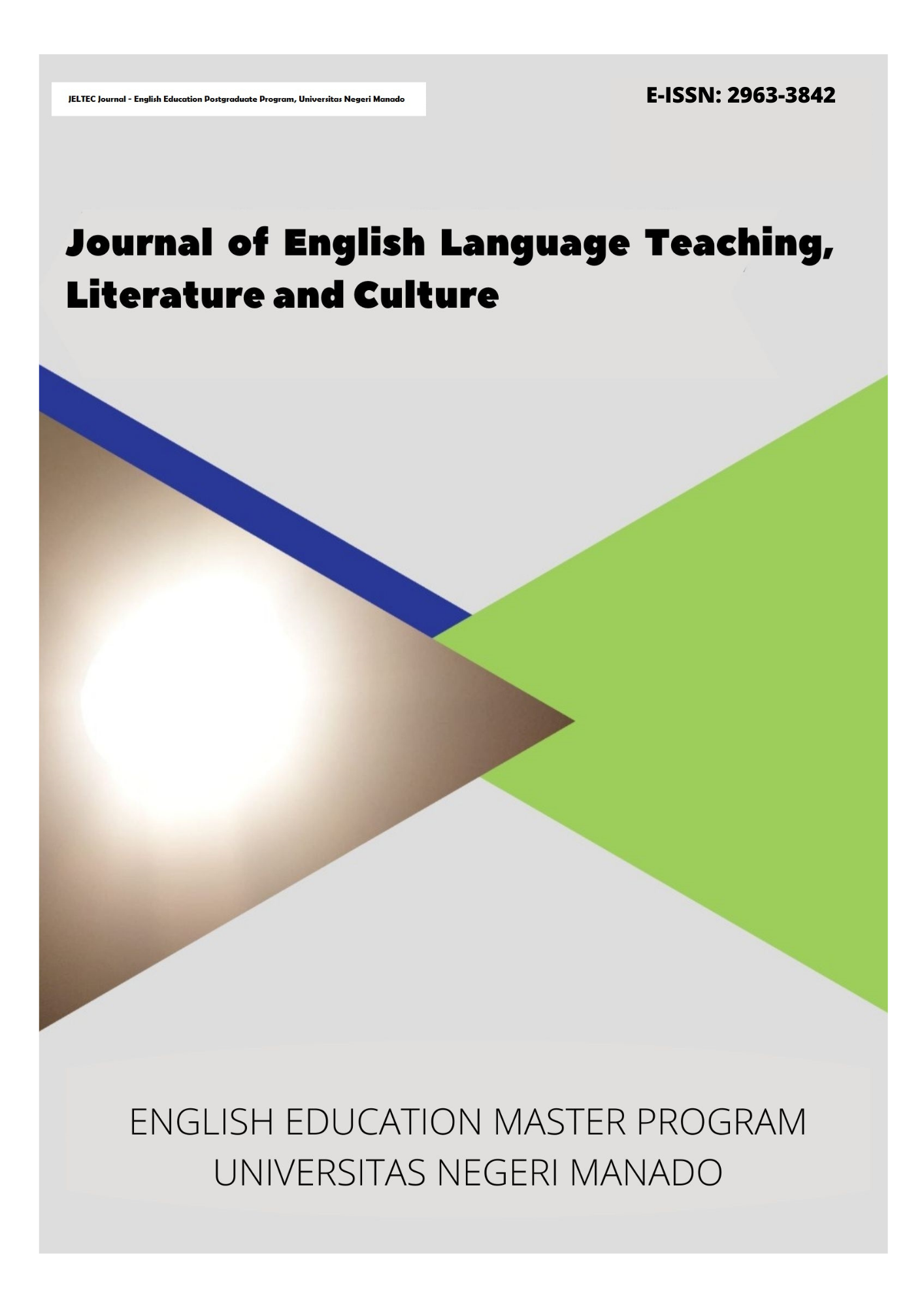Improving Young Learners Vocabulary by Using Digital Technology
DOI:
https://doi.org/10.53682/jeltec.v1i1.3723Keywords:
Vocabulary; Digital Technology; EYL; EFLAbstract
This writing aims at describing the possible ways in increasing young learners vocabulary Vocabulary is a very important part of language When we learn a language like English we learn the words in the language Vocabulary is needed to master the four skills of English Through vocabulary we convey our thoughts emotions and efficiency Although it is often hampered by lack of grammar or grammatical errors in its use But in communication it does not become an obstacle as long as the speaking partner understands The methodology of this research is library research Using previous research as the basis of what is being researched Understanding the important things to take as material from this research To improve young leaners vocabularies by technology need guidance between parents teacher and school environment As a form of response to technological developments stakeholders are Education sector conducts teacher training teacher education and teacher professions developing Vocabulary not only mastered by young leaners but there are others too When they have oral or written communication language they use vocabulary to express their thoughts and ideas Although in reading one must understand the meaning of words write on the text Of course master English vocabulary takes time and process < em>< p>
References
A S Hornby 2006 Oxford Advanced Learner s Dictionary Oxford University Press
Lengkoan F Andries F A Tatipang D P 2022 A STUDY ON LISTENING PROBLEMS FACED BY STUDENTS OF HIGHER EDUCATION Globish: An English Indonesian Journal for English Education and Culture 11 1 41 50
Liando N V Serhalawan E Wuntu C 2021 Analysis of Teacher Made Tests Used in Summative Evaluation at SMP Negeri 1 Tompaso Jurnal Ilmiah Wahana Pendidikan 7 8 480 493
Lumentut Y Lengkoan F 2021 The Relationships of Psycholinguistics in Acquisition and Language Learning Journal of English Culture Language Literature and Education 9 1 17 29
Mamaghe N Rombepajung P Hampp P 2020 Improving Students Mastery Of Vocabulary Through The Use Of Glossing Technique English Education Department Faculty of Languages and Arts Universitas Negeri Manado 129 144 https: doi org 10 53682 eclue v8i2 1908
Maru M G Tamowangkay F P Pelenkahu N Wuntu C 2022 Teachers perception toward the impact of platform used in online learning communication in the eastern Indonesia International Journal of Communication and Society 4 1 59 71
Mirzaqon T A dan Budi Purwoko 2017 Studi Kepustakaan Mengenai Landasan Teori dan Praktik Konseling Expressive Writing Jurnal BK Unesa 8 1
Neuman S B Dwyer J 2009 Missing in Action: Vocabulary Instruction in Pre k The Reading Teacher 62 384 392 http: dx doi org 10 1598 RT 62 5 2
Hurlock B Elizabeth 1978 Perkembangan Anak Jakarta: Erlangga
Pajow C N Rorintulus O A Liando N V Batunan D A 2021 THE ILLOCUTIONARY SPEECH ACTS ON ANNE OF GREEN GABLES MOVIES A PRAGMATICS STUDY
Panambunan E Tulung G J Maru M G 2016 Improving students speaking ability through communication language teaching of the students at MEC Megalia English Course Universitas Negeri Manado : Lembaga Penelitian Unima
Kandati S P Tatipang D P 2021 THE EFFECT OF VIRTUAL TEACHING ON ATTITUDES OF SECOND LANGUAGE ACQUISITION DURING COVID 19 CONDITIONS OF INDONESIAN STUDENTS Journal of English Culture Language Literature and Education 9 2 117 127
Linse Caroline T Practical English Language Teaching: Young Learners NY: Mc Graw Hill 2006
Santrock John W 2007 Live Span Development Jakarta: Gelora Aksara Pratama
Lestari Sri and Setiyawan Radius 2020 Technology Era Global English CLIL: Influence and its Impact on English Teaching for Young Learners in Indonesia IOP Conference Series: Earth and Environmental Science Vol 469 Doi: 10 1088 1755 1315 469 1 012094
Rorintulus O A Singal Y Batunan D A Mamentu C 2021 WRITING PROJECT IN EFL CLASS: FROM DESIGN TO RECOMMENDATION: A SYSTEMATIC REVIEW
Roring S A Kamagi S 2020 THE EFFECTIVENESS OF USING KIM S MEMORY GAME TO INCREASE STUDENTS VOCABULARY AT THE SECOND GRADE OF JUNIOR HIGH SCHOOL Journal of English Culture Language Literature and Education 8 1 51 63
Stahl Steven A Nagy William E 2015 Teaching Word Meanings Routledge






